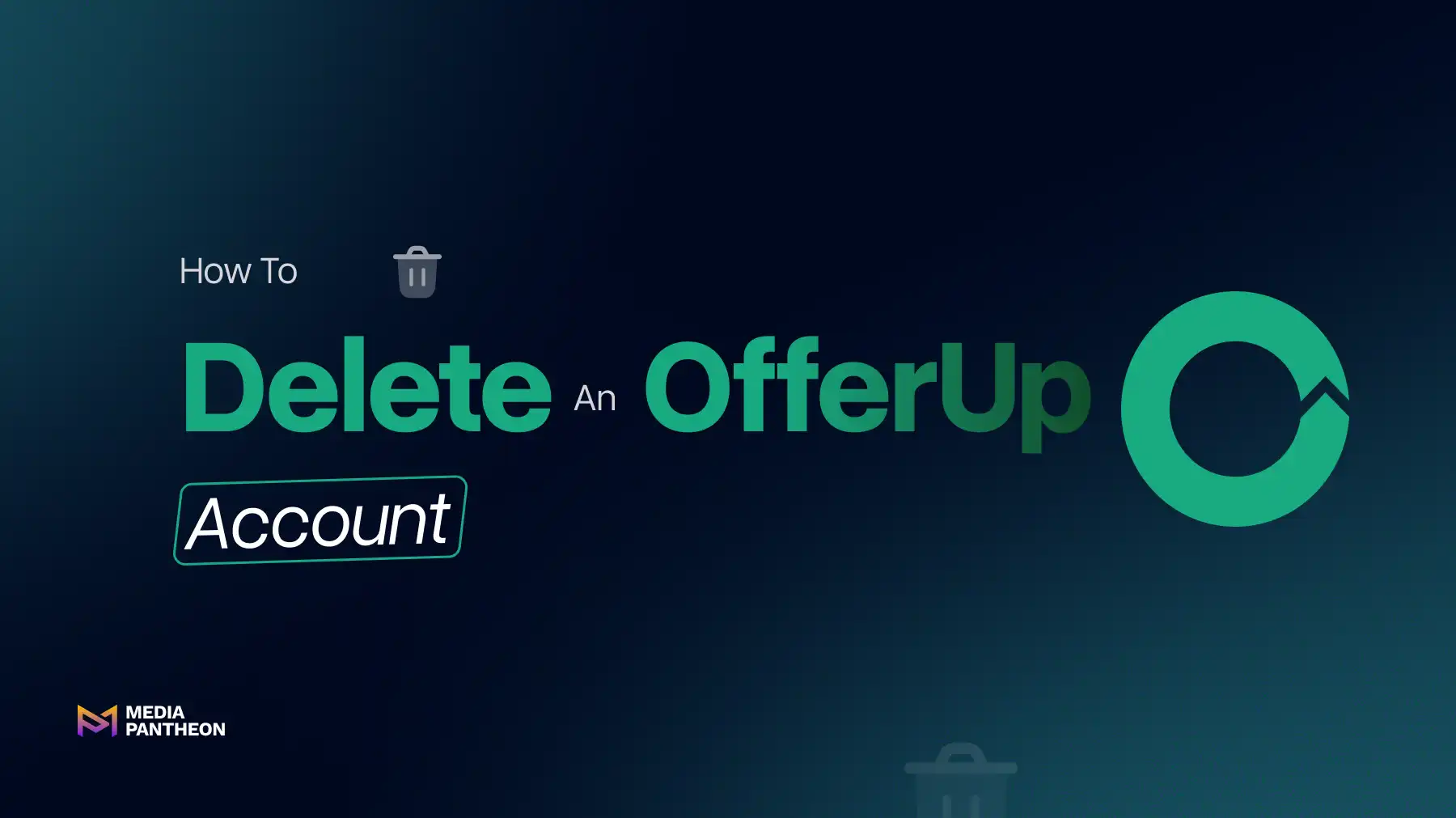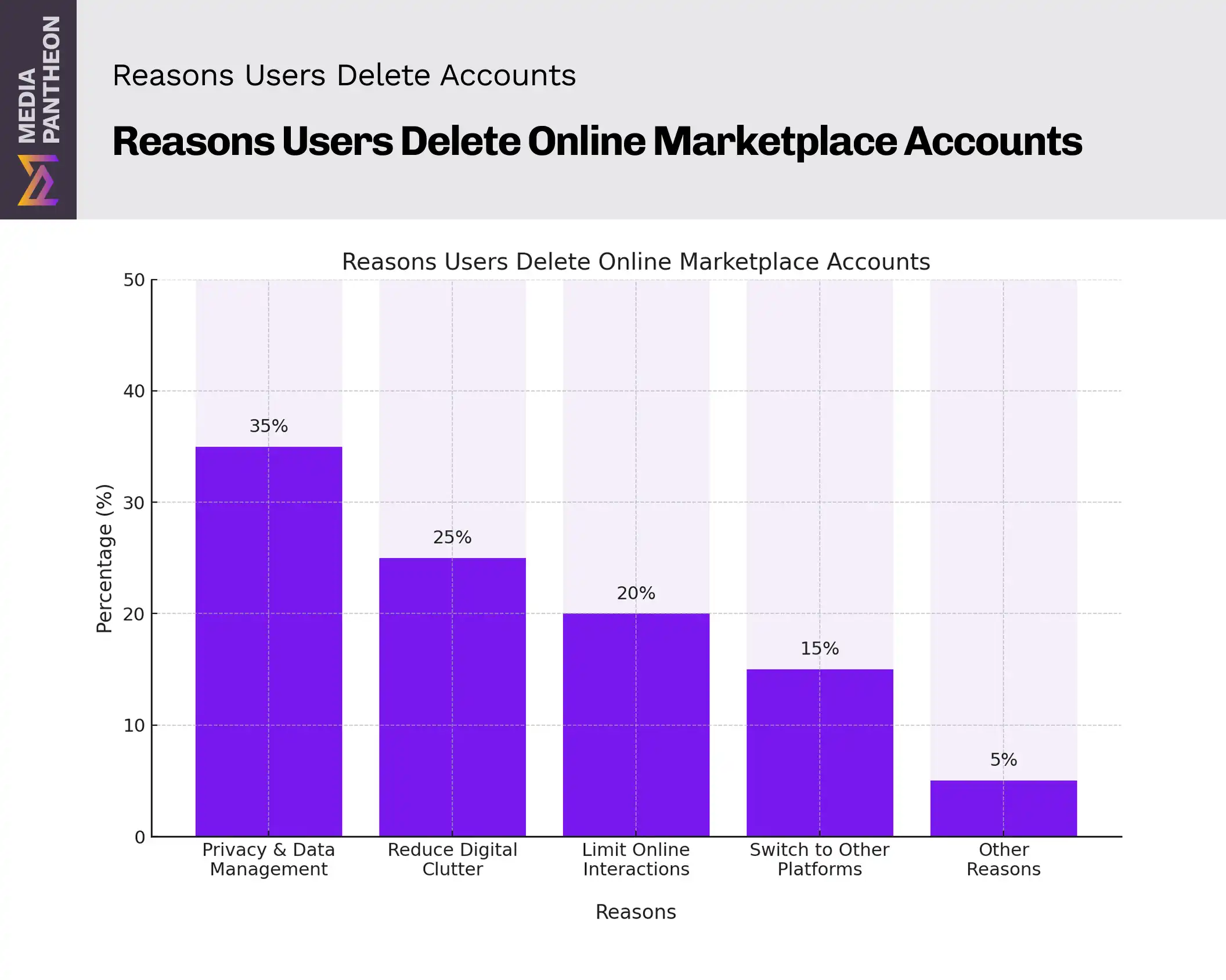Home Media Pantheon Blog How To Delete an OfferUp Account
Table of Contents


Foued
13 MIN READ
Online marketplaces have reshaped the way people trade locally. OfferUp is one of those platforms, allowing you to buy and sell almost anything with a few taps. It is convenient, quick, and built for community-level transactions. Yet convenience comes at a cost.
Unused accounts pile up in your digital life. Every one of them holds personal data like your name, email, and transaction history. Keeping those accounts active increases exposure to risks such as breaches and unwanted data sharing. Digital cleanup is becoming as important as physical decluttering.
According to the U.S. Government Accountability Office (GAO) more than 74 percent of Americans worry about how companies use their personal data. This concern drives people to take stronger steps toward controlling their online presence. One way to do this is learning how to properly close accounts you no longer need.
OfferUp is no exception. Whether you want to reduce digital clutter, protect privacy, or simply move on to other selling platforms, understanding the full process of deleting an OfferUp account ensures you leave the platform on your terms.
Open OfferUp, go to Settings, choose Delete Account, confirm the prompts, and sign out. This permanently removes your profile, listings, and data. Uninstall the app afterward to prevent accidental reactivation and free device space.
Deleting your OfferUp account is a big step. It wipes out your public profile and removes your listings from search. Since the change cannot be undone, it’s a good idea to finish any conversations and save important records before you move forward.
Keep in mind that you must complete deletion directly through your account on the app or website. Email requests alone won’t work. This rule is in place to prevent unwanted removals and to make sure you stay in control of your identity and activity.
Before you start, make sure you’ve wrapped up or canceled any active deals. Deleting your account in the middle of a transaction can confuse buyers and may even affect your reputation on other platforms. Once you’re ready, follow these steps:
When you’re done, double-check that your profile has been removed. Try searching for it from another device or browser. If old cached results still appear, clear your browser history and check again later. Before taking this last step, make sure you’ve tied up any loose ends to avoid problems down the line.
Before deleting OfferUp, complete pending sales, withdraw funds, and save important records. Preparing ahead avoids confusion and ensures a smoother transition away from the platform.
Since account deletion is permanent, taking time to prepare is essential. If you have open sales, finish them first because buyers may be counting on you to complete the deal. Deleting too soon can cause unnecessary issues.
Here’s a quick checklist to guide you through preparing for OfferUp account deletion:
Once you have checked off these tasks, you can move forward with deletion confidently. A little preparation helps you avoid conflicts, protects your reputation, and makes sure your exit from OfferUp is smooth and stress free.
Finally, remember to understand what happens to your data once the account is permanently deleted.
Deleting an OfferUp account removes your profile and listings, but some transactional data may be retained for compliance with legal requirements. Personal visibility ends, yet limited financial records stay stored temporarily.
When you remove your account, your public-facing data disappears immediately. Your name, photos, and listings are no longer visible to other users. Messages are hidden, though they may remain in the recipient’s chat history.
OfferUp, like many platforms, follows U.S. laws that require financial records to be retained for a set period. The Federal Trade Commission (FCC) notes that certain transaction data must remain stored for up to five years under legal and tax regulations.
Here is a summary of what happens after OfferUp account deletion:
| Data type | Status after deletion |
| Profile information | Permanently removed from search |
| Listings and photos | Deleted from platform immediately |
| Messages | Hidden, but visible to recipient |
| Transaction records | Retained for compliance temporarily |
Understanding this balance is key. While your visible presence is gone, compliance obligations mean some records stay stored in a secure manner.
This ensures both user privacy and legal protection. Equally important is taking steps to strengthen your privacy and secure your account before deleting it.
Before deleting OfferUp, log out from all devices, change your password, and unlink connected accounts. These steps strengthen your privacy and prevent lingering access after the account is removed.
Account deletion is only one piece of digital hygiene. Before confirming, it is best to secure your data. Logging out of devices ensures no open sessions remain. Changing your password before deletion protects you if the account was ever compromised.
Also check linked accounts. If you signed up using Facebook or Google, go to those platforms and remove OfferUp permissions. This step closes background connections that could otherwise linger.
Privacy is a growing concern across the country. According to the Pew Research Center, Americans, especially Republicans, are increasingly worried about how the government uses the data it collects about them, with about seven-in-ten U.S. adults (71%) saying they are very or somewhat concerned, up from 64% in 2019. In response, we help businesses strengthen online safety for their websites by providing optimized protection that minimizes risks and supports long-term digital resilience.
By taking extra precautions, you control more of your online footprint. Still, if you are not ready for a permanent exit, there is also the option to pause your account and return whenever you choose.
To pause your OfferUp account, go to Account Settings, select Deactivate Account, and confirm. This hides your listings and notifications without deleting your data. Reactivate anytime by logging back in to restore full access.
Not every user wants to fully cut ties with OfferUp. For those uncertain, pausing is a safer option. By deactivating, your listings are hidden but not erased. This gives you the flexibility to return later without losing your account history.
Pausing can be especially useful for sellers with established reputations. Reviews, ratings, and completed transactions remain intact. When you log back in and reactivate, your account returns to normal.
This option is ideal if you need a break from notifications or are temporarily stepping away from online selling. Unlike deletion, deactivation does not erase data permanently.
It is a reversible step for users who want both privacy and flexibility. Still, many users choose a more permanent solution, and their reasons highlight why deletion remains a common choice.
People delete OfferUp or other marketplace accounts mainly to simplify digital life, manage notifications, limit online interactions, or move to broader platforms. Research shows privacy and digital clutter are leading drivers behind account closures.
Some users want to limit screen time and reduce the number of apps on their devices. Others close accounts because they prefer stronger control over how their information is managed or because they are overwhelmed by frequent alerts.
Trust and convenience also matter. Online marketplaces can sometimes feel crowded with duplicate listings, inactive users, or exchanges that do not result in successful sales. For many, removing an account becomes the simplest way to reduce frustration and maintain peace of mind.
Another factor is the shift to competing platforms. Alternatives like eBay or Facebook Marketplace offer different features, broader reach, or built-in communities. For users looking for more integrated options, switching platforms may be more appealing than maintaining multiple accounts.

The chart above illustrates why users delete marketplace accounts: 35% for data management and control, 25% for reducing digital clutter, 20% for limiting online interactions, 15% for switching to other platforms, and 5% for other reasons. These findings apply broadly to online marketplaces, not just OfferUp.
Ultimately, choosing the right platform depends on personal goals and selling habits. If moving on feels like the better choice, there are several alternative marketplaces that can meet individual needs while offering different ways to buy and sell.
After deleting OfferUp, sellers often turn to alternatives like Facebook Marketplace, Craigslist, eBay, or Mercari. Each platform offers different audiences, features, and advantages for selling online.
When leaving OfferUp, it helps to know your options. Each alternative marketplace comes with unique benefits. Choosing the right one ensures your selling needs continue to be met without interruption.
Facebook Marketplace is one of the most widely used platforms for local sales. It connects directly with your social network and local community, making it easy to reach buyers nearby. However, many casual browsers use it without the intent to purchase, which can sometimes lead to wasted time.
Craigslist remains a long-standing option for general classifieds. Its strength lies in the sheer range of listings you can post, from furniture to vehicles. Still, its design is outdated and its lower security features mean you must take extra precautions when meeting buyers.
eBay is best for sellers who want global reach. With auction-style and fixed-price options, sellers can target both collectors and everyday shoppers. Strong buyer protections are in place, but the platform’s selling fees can reduce profits, particularly for low-cost items.
Mercari provides an app-first approach with integrated shipping solutions. It is easy to list items and ship them directly to buyers, making it convenient for those who prefer a simplified process. The trade-off is a smaller audience compared to larger platforms and fees that apply to each sale.
Here is a comparison of popular choices of alternatives to OfferUp:
| Platform | Advantage | Disadvantage |
| Facebook Marketplace | Large local user base, easy to access | Many casual browsers, low intent |
| Craigslist | Wide range of listings, free to use | Outdated design, lower security |
| eBay | Global reach, auctions and fixed pricing, buyer protections | High seller fees, strong competition |
| Mercari | Simple app interface, integrated shipping | Smaller audience, seller fees apply |
Exploring alternatives keeps your selling options open. While OfferUp focuses on local sales, platforms like eBay expand to a global market. The right fit depends on whether you prioritize convenience, security, or reach. Once you have prepared for closure, it is also worth knowing whether a deleted OfferUp account can ever be recovered.
A deleted OfferUp account cannot be recovered. Once removed, the only way to use the platform again is by creating a brand-new account. Deactivation is safer for users who are unsure.
This means that once you confirm deletion, there is no option to restore your old profile. OfferUp does not provide a recovery window, nor does it allow customer support to reactivate deleted accounts.
The process is designed to protect user control and ensure that only deliberate deletions are permanent.
Losing an account also means losing all profile data, reviews, and transaction history. For active sellers, this can be significant because a trusted reputation helps attract buyers.
Creating a new account will not transfer past credibility, and you must build your presence from scratch.
For buyers, a deleted account cannot be restored to view previous conversations or manage old purchases. While receipts for completed transactions may still be valid, the account itself cannot be re-accessed or reopened.
Deactivation is therefore the better option for those who are unsure. Unlike deletion, it allows you to pause activity while keeping your information safe for future use.
If you later decide to return, you can simply log back in and continue where you left off.
Many users regret deleting too quickly. They lose reviews, chat history, and established presence. By deactivating first, you can test your break before fully cutting ties.
This safety net avoids the frustration of starting over from zero. Understanding these trade-offs also means looking at how deletion affects both sides of the marketplace.
Deleting an OfferUp account removes listings, hides profiles, and ends communication. Buyers lose access to your listings, while sellers lose their visibility and ability to complete ongoing sales.
The impact extends beyond just the individual. For sellers, all active items vanish immediately. This may disappoint buyers who were considering a purchase or waiting on a response to complete a deal.
For buyers, receipts for past transactions remain valid, but your profile is no longer available for follow-up. This means if an issue arises with an item after sale, communication is cut off.
Messages may still exist in the other person’s inbox, but you will not be reachable. Buyers might see your older chats, but they will no longer have a way to contact you or verify your account.
Sellers lose more than just listings. They also lose accumulated reputation. Reviews, ratings, and transaction history are erased from the platform, removing valuable trust signals built over time.
This loss of credibility can make starting fresh difficult. A new account has no reviews, which reduces buyer confidence and may lead to slower sales compared to your original profile.
Active negotiations are also disrupted. If you delete mid-conversation, buyers are left without clarity, which could cause disputes or dissatisfaction. This can harm your reputation outside OfferUp if buyers know you personally.
Finally, deletion reduces your long-term visibility in community marketplaces. You effectively erase your presence, which can be freeing, but also means losing a digital identity you once built for selling.
To delete your OfferUp account, log in, access settings, select delete, confirm the choice, and uninstall the app. This process permanently erases your profile, listings, and data from the platform.
Deleting an account is a strong move toward controlling your digital identity. It ensures you protect your privacy, simplify your digital life, and close accounts no longer in use.
By preparing carefully and exploring alternatives, you can exit smoothly while keeping your online presence safe and intentional. And if you’re ready to continue selling online without the limitations of third-party platforms, we can help you build a professional eCommerce website that gives you full control over your store, branding, and customer experience.
About Foued
Foued is the CEO of Media Pantheon, Inc., a full-stack developer, web accessibility expert, and the technical lead behind 1,000+ website builds worldwide. Fluent in English, German, French, and Arabic, he and his team deliver fast, secure, and scalable digital experiences engineered for long-term growth.


Our Work, Your Inspiration
Suggested Blogs
Explore the projects that showcase our expertise and creativity. From innovative designs to robust functionalities, our portfolio reflects the success
Get Started